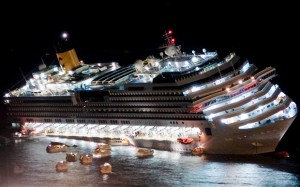Condition Your Instincts - What the Carnival Cruise Crisis Teaches Us
The Following Post Was Originally Written For and Published By CommPRO.biz
 Photo: AP
Photo: AP
The tragedy of the cruise ship, Costa Concordia, continues to unfold as the death toll has risen to 16 with 16 others still unaccounted for. However, in the early stages of the crisis, the loss of human life was overshadowed by the strange behavior of the ship’s captain, Francesco Schettino. Allegedly, Capt. Schettino left the vessel in a lifeboat, leaving women, children and his fellow crew members aboard. According to reports, Captain Schettino faces charges of manslaughter, shipwreck and abandoning ship in the aftermath of the accident. He remains under house arrest, pending formal charges from prosecutors.
Certainly not helping Capt. Schettino’s case is the leaked audio of his conversation with the Italian Coast Guard. Capt. Schettino, allegedly looking upon the ship from the safety of a life boat that he “fell in to,” is repeatedly ordered by a Coast Guard official to return to his vessel and “do his duty.” The obviously shaken and terrified Schettino offers some meek reasons for his actions, but ultimately does not return to the vessel. This bizarre reaction to an inherent responsibility got me thinking about how humans react in crisis situations, and particularly those who are consistently trained to react in a certain way.
Over my career, I have worked with many companies in the marine transport sector. I also have had the privilege of standing on the bridge of a number of vessels, learning about how supertankers and cargo ships operate. Invariably, the officers of these ships talk about their love of the sea and their training. Specifically, they relate how they spend a tremendous amount of time not only preparing for crises, but also retraining, drilling and planning for storms, hull breaches and pirate attacks, to name a few. The objective, as one Greek captain shared with me, is to “make the unexpected as natural as breathing.” In other words, you practice and drill so often, that at the first sign of trouble, your instincts and training take over. You react not to the situation itself but to the need to exercise your training. At first glance, it appears that Capt. Schettino’s training was incomplete in this regard.
But how does this relate to communications professionals?
For agency practitioners, the vast majority of time is focused on metrics agreed upon with their clients. The goal is to meet and exceed those goals while keeping the client happy. Reaching those goals requires hard work and creativity, but does not require instant reaction or instinct. In essence, these are the calm seas and clear skies of corporate communications.
When a crisis hits, however, you need to react quickly, authoritatively and decisively. The time to crisis plan is not when the risk event has already happened, but constantly and methodically, over the life of the engagement.
I believe that there are a few tips and tricks that all corporate communicators can employ to ensure that they are better prepared when the extraordinary occurs:
- Embrace paranoia. Resting on your laurels is the quickest way to get swiftly knocked down. No matter what you accomplished yesterday, we live in a real-time, instant-gratification, what-have-you-done-for-me-lately world. Treat each triumph and each success as a stepping-stone to more success. All the while recognizing that the more you succeed, the more people will be gunning for you. A healthy dose of paranoia will keep you honest, on your toes and ready for the unexpected.
- Learn from your peers. More precisely, steal best practices and do not replicate mistakes. The interesting thing about crises is that they are rarely “new.” It may not have happened to you before but chances are, someone has gone through the exact same scenario, or something very much like it. Don’t reinvent the wheel where you don’t have to. Watch, learn and build a response plan in part based on what has worked for others.
- Practice breathing. Like the Greek tanker captain stated, you can condition your instincts. While this is easier said than done, it pays incredible dividends when you need to act. Plan different scenarios with your clients, both internal and external, and run drills. Pick a day to break a piece of “mock news,” and see how the team reacts. Do this at least quarterly or even monthly if you can. Above all, modify your response plan based on these drills. Your communications plan is a living, breathing document, and should always benefit from new learning. Make your crisis component, even if you never have to use it, part of your daily execution.
Corporate communications professionals are never more integral to their clients, be they internal or external, than when faced with a corporate scandal, a negative financial event, or any crisis outside the scope of “normal” deliverables. Being prepared goes beyond knowing what your firm’s crisis billing rate is. It means constantly, even fanatically, considering the potential pitfalls your client may face. This type of conditioning will allow you to keep a level head and make the best possible decisions when disaster strikes. Finally, constantly challenge yourself. When faced with a crisis, will your instincts serve you well, or will you “accidentally” fall into the life boat, watching from afar? (The above post can also be viewed here.) ![]()
